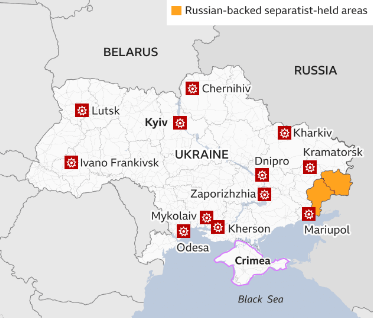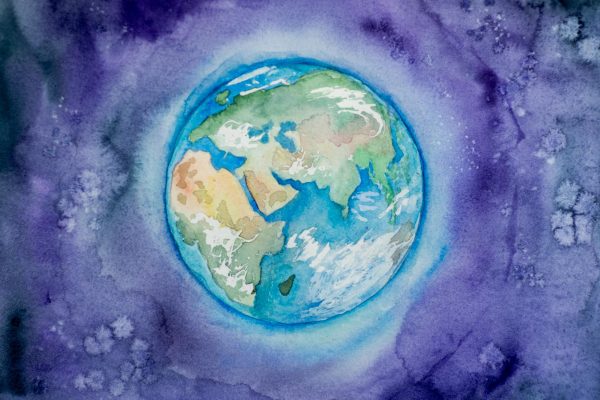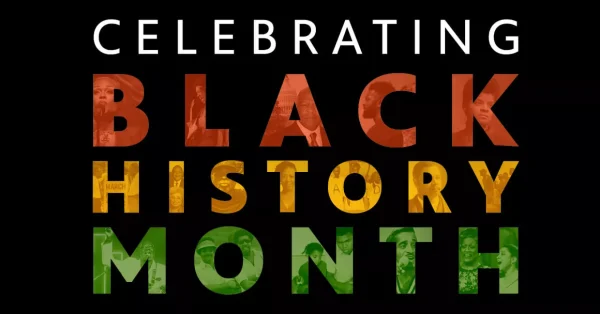Six Months of Lies

This image shows the borders between Russia and Ukraine and their proximity.
News broke out on February 24, 2022, that Russia had infiltrated Ukraine. Russia stationed its troops in Ukraine, and 7 million people in Ukraine had to evacuate their country. After the attacks on Ukraine, 5,200 civilians were reported dead, while others had to leave Ukraine and struggled to accumulate the needed resources. Roads and bridges were destroyed and essentially insurmountable that they couldn’t get to stores for water, food, and even electricity and heat. Since February, there have still been conflicts between Russia and Ukraine, and in February, President Vladimir Putin proclaimed that Ukraine wasn’t an actual country.
President Putin’s speech explained, “Let me emphasize once again that Ukraine for us is not just a neighboring country. It is an integral part of our own history, culture, and spiritual space.” His intentions of re-establishing Russia’s empire by invading Ukraine were false. Putin declared Ukraine as part of Russia’s historic territory, thus giving them the “right” to take over Ukraine. Instead, he attacked Ukraine as an independent country.
Russia has regulated its media this past year, so only certain people see specific news. When the government controls the media, it usually puts a particular view of their country out to their people. This is what Russia is doing right now; they control the press by blocking specific sites and channels on television, so they don’t see certain things. During the war, Russia exterminated independent news outlets and implemented new censorship laws so people couldn’t access outside information. Only 10% of Russia has access to VPNs, and virtual private networks allow people to access information without someone learning their IP address. The technology encrypts the data and directs it to a secure network; it ensures that no one learns of the websites and networks you accessed. Only a small percentage of Russia has the advantage of VPNs, while the rest get their news from state-controlled media. It is mostly elderly people who struggle to learn veracious news because the only way they understand what’s happening in the world and Russia is from Russian television channels, which are modulated. However, younger people have an advantage of the internet that they can carefully access. If they see new news headlines and information from other countries, they get a different view of Russia and Ukraine. Younger people are more adapted to technology and know their way around it, so they have a way of apprehending what other countries think of the situation. In this case, younger people have the upper hand that elderly people do not. Some internet outlets are providing what should be censored information, going against Russian censorship laws, and allowing people to have accurate knowledge.
Since people who live in Russia need to get the correct information they need, former Prime Minister of the UK, Boris Johnson, advised Russians to derive virtual private networks from accessing international media networks. Although Russians and other people don’t think his statement will be much of an influence since Russians mainly control all of their media.
The few percent of people that can get VPNs only do a little with the information they can access, as they just tell a few people they trust. People still fear that speaking openly about it might lead to bad outcomes because of the environment there. Regulating their freedom to speak blatantly compresses the information from spreading, which is Russia’s motive. The Russians aren’t afraid to access VPNs because they’ve been through extreme situations like this before where they have had to use VPNs.
As some Russians aren’t assimilating accurate information, it is not entirely false, just altered, so they don’t get the whole truth. Russia functions to extend an immense amount of misinformation, which often does contain parts of the truth. In an Insider article, they interview a Russian vlogger to discuss her viewpoints on Russia and Ukraine. She anticipates that most Russians are aware of the violence occurring in Ukraine but aren’t privy to the information they’re being told that does not rely on actuality. Because people in Russia aren’t getting the most precise information, they should be getting their perspectives and opinions affected by the information that is being regulated. Their political views are swayed because they’re only getting a certain side. The Insider article stated that some Russians were so persuaded by the advertisements that they wouldn’t even believe their Ukrainian friends and family when they spoke about the war in Ukraine and their experiences. Russia’s media is so controlled that people have created this mindset, affecting Ukrainian people because they aren’t feeling heard acceptably.
Sources
https://www.rescue.org/article/ukraine-russia-crisis-what-happening




